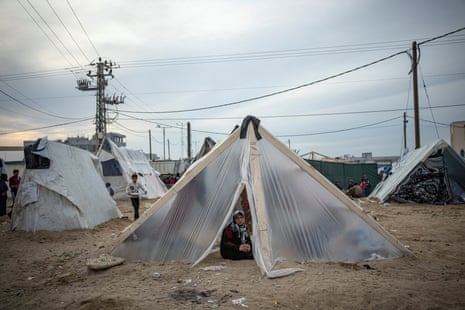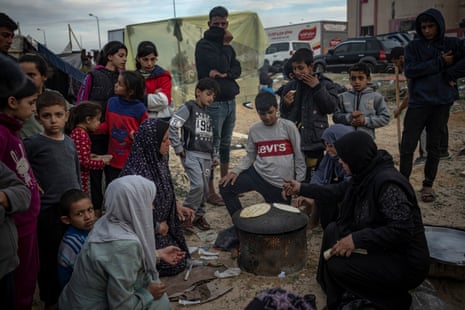Israel to open Kerem Shalom crossing with Gaza for first time in war

Patrick Wintour
Israel will open the Kerem Shalom crossing with Gaza for the inspection of humanitarian aid trucks for the first time since the outbreak of the war, a senior Israeli official has said.
The Guardian’s diplomatic editor, Patrick Wintour, reports:
The west has been pressing for the crossing to be opened for more than a month to allow more aid into the Gaza Strip, but has met Israeli resistance. The threat of a UN ceasefire resolution may have led the US to increase the pressure on Israel, and the offer being made by Israel still falls short of what the west had sought.
Col Elad Goren, from Israel’s Cogat military liaison to the Palestinians, did not give a date for the crossing to be opened and said the crossing point would be used to increase the capacity to inspect aid trucks, but not to allow aid into Gaza directly.
Instead the aid after inspection will be required to be taken to the Rafah crossing into Egypt. Goren said that even without Kerem Shalom, Israel is capable of facilitating the entry of up to 250 aid lorries each day through Egypt’s Rafah crossing. He blamed the UN collection process for the slow flow of aid, and not the Israeli inspection process.
The UN said on 6 December that 80 trucks carrying humanitarian supplies and 69,000 litres of fuel entered from Egypt into Gaza.
The UN said:
This is well below the daily average of 170 trucks and 110,000 litres of fuel that had entered during the humanitarian pause implemented between 24 and 30 November, and the average of 500 truckloads (including fuel) that entered every working day prior to 7 October.
Key events
The UN has said 1.87 million people – more than 80% of Gaza’s population – have been driven from their homes in the past two months.
Many families have been displaced multiple times to avoid the Israeli advance, and are living in tents and overcrowded makeshift shelters.




The son of Israeli cabinet minister Gadi Eizenkot has been killed in fighting in northern Gaza, the Israel Defense Forces (IDF) said.
The IDF did not provide precise details about the death of Gal Meir Eizenkot, 25, other than to say he was killed in combat in the northern Gaza Strip.
Benny Gantz, leader of the National Unity party, to which Eizenkot belongs, said in a statement:
Together with all of Israel I send my support to Gadi and to his entire family, and a big hug. We are all committed to keep fighting for the sacred cause for which Gal died.
The US military has resumed its flights of surveillance drones over Gaza to aid the search for hostages taken by Hamas, the Pentagon said.
The US had paused its drone flights over Gaza during the temporary ceasefire between Israel and Hamas, which collapsed last week.
The Pentagon spokesperson Lisa Lawrence said in a statement on Thursday:
In support of hostage recovery efforts, the US has resumed unarmed UAV flights over Gaza, and we continue to provide advice and assistance to support our Israeli partner as they work on their hostage recovery efforts.
Three-year-old twins Emma and Yulio Cunio and their mother, Sharon Aloni Cunio, 34, who were held hostage by Hamas in Gaza, have been discharged from hospital.
The three were released on 27 November as part of a temporary ceasefire deal between Hamas and Israel. They were discharged from Schneider children’s medical centre on Thursday, the Times of Israel reported.
Sharon’s sister Danielle Aloni, 44, and her daughter Emilia, five, were also held hostage and were released on 24 November.
The twins’ father, David, 34, is still in Hamas captivity in Gaza.

Four arms factories in the UK producing parts for Israeli fighter jets have been forced to close by protesters operating under the banner Workers for a Free Palestine.
The four factories are Eaton Mission Systems in Bournemouth, BAE Systems at Samlesbury Aerodrome in Lancashire, L3Harris factory in Brighton and Hove, and BAE Govan in Glasgow. All produce parts for F-35 stealth combat aircraft currently being used by Israel to bombard Gaza.
The protesters, who include health workers, teachers, hospitality workers, academics and artists, are calling for an end to arms sales to Israel and for the UK government to support a permanent ceasefire.
The blockades have been organised in coordination with workers in France, Denmark and the Netherlands, who are also blockading arms factories.
UN aid chief says ‘promising signs’ that Kerem Shalom crossing could soon open for humanitarian aid
The UN aid chief, Martin Griffiths, has said there are “promising signs” that the Kerem Shalom crossing in Israel could soon be opened to allow more humanitarian aid into Gaza.
Griffiths, speaking to reporters in Geneva on Thursday, said:
We’re still negotiating, and with some promising signs at the moment. There are promising signs now that that may be able to open soon.
His comments came after a senior Israeli official said that Israel will open the crossing for the inspection of humanitarian aid trucks for the first time since the outbreak of the war.
Col Elad Goren, from Israel’s Cogat military liaison to the Palestinians, did not give a date for the crossing to be opened and said the crossing point would be used to increase the capacity to inspect aid trucks, but not to allow aid into Gaza directly.
Griffiths said both Israel and Egypt had become much more open to the idea of reviving the Kerem Shalom route. The crossing would open “probably not in one go, but certainly gradually,” he said, adding:
It would be the first miracle we’ve seen for some weeks, but would also be a huge boost to the logistical process and logistical base of a humanitarian operation.
The Kerem Shalom crossing was used to carry more than 60% of the truckloads going into Gaza before the current conflict.
The World Health Organization (WHO) said it has documented 236 attacks on health care in the West Bank since 7 October.
In a post on social media, the WHO described the number of attacks as “unprecedented”, and called for “the respect of international law and active intervention to ensure the protection of health care”.
WHO has documented an unprecedented number of attacks on health care in the West Bank in the past two months, since 7 October 2023.
236 health attacks have resulted in:
🔹Obstruction to delivery of health care (60%; 142 attacks)
🔹Use of force against health care (53%; 126… pic.twitter.com/CCy98ybH9M— WHO in occupied Palestinian territory (@WHOoPt) December 7, 2023
The US secretary of state, Antony Blinken, spoke with Israel’s strategic affairs minister, Ron Dermer, today, a senior US state department official has said.
During the call, Blinken conveyed that Israel needs to do more to protect civilians in its offensive in southern Gaza, Reuters reported.
Blinken also urged Dermer to let Israel to allow more humanitarian aid into Gaza while welcoming its decision to let more fuel into the territory, the official said.

Patrick Wintour
The destruction of more than a third of Gaza’s homes as Israel bombards the territory in pursuit of Hamas is leading international legal experts to raise the concept of “domicide” – the mass destruction of dwellings to make the territory uninhabitable.
In the current Gaza war, independent experts estimate that as much as 40% of the housing in Gaza has been damaged or destroyed. The UN says 1.8 million people are internally displaced inside Gaza, many living in overcrowded UN shelters in the south.
Although Gaza has been damaged in previous conflicts and rebuilt, largely with money from the Gulf states, the current scale of the devastation is of a different order.
At issue is whether the scale of the infrastructure damage is a byproduct of the search for Hamas or part of a covert plan to expel Palestinians from Gaza, erasing the possibility of Gaza becoming a semi-viable society in the foreseeable future.

Domicide, a concept increasingly accepted in academia, is not a distinct crime against humanity under international law, and the UN special rapporteur on the right to housing tabled a report to the UN in October last year arguing that “a very important protection gap” needed to be filled.
The destruction of homes in Aleppo in the Syrian civil war, the flattening of Rohingya settlements in Myanmar and the destruction of Mariupol in Ukraine have in recent years increased focus on the issue.
“It is necessary to address hostilities being carried out in the knowledge that they will systematically destroy and damage civilian housing and infrastructure, rendering an entire city – such as Gaza City – uninhabitable for civilians,” the UN rapporteur, Balakrishnan Rajagopal, a law professor at the Massachusetts Institute of Technology in Boston, told the Guardian.
Read the full story: Widespread destruction in Gaza puts concept of ‘domicide’ in focus
The head of Médecins Sans Frontières, Christos Christou, said he witnessed ambulances being prevented from reaching patients and the hospital entrance blocked during an Israeli military incursion into the Jenin refugee camp in the occupied West Bank.
Speaking to reporters at MSF’s headquarters in Geneva, he said:
Inside the hospital you can feel the level of desperation, knowing that you’re not able to reach the people. There’s nothing worse for a doctor than not being able to reach patients.
Within the Gaza Strip, patients were arriving in hospitals with severe injuries due to Israel’s bombardment and dehydration, he said.
“Something quite under-reported is the level of psychological trauma that we see,” he added, notably among children arriving in Gaza hospitals with no surviving relatives.
Even if they are intact and they are OK, there is a huge psychological trauma there that will take, I don’t think only years, it will take generations to be healed.
The medical charity Médecins Sans Frontières said there had been a “clear shift” in the injuries of Palestinian gunshot victims in the occupied West Bank since the start of the Israel-Hamas war.
MSF staff in West Bank hospitals have noted that victims are now being shot more often in the head and torso rather than the limbs, according to the organisation’s international president, Christos Christou.
“The type of trauma they are dealing with has changed completely,” Christou told reporters at MSF’s headquarters in Geneva on Thursday, AFP reported.
In the past, the mechanism of the shooting was different. They were targeting the limbs. Instead of having injuries in the limbs, they have gunshot wounds in the abdomen, the trunk and the head.
This is a clear shift. When you see that shift in the trauma, you will see more and more dead people.

Daily settler attacks against Palestinians in the West Bank have more than doubled, UN figures show, since the Hamas attacks on Israel on 7 October.
More than 250 Palestinians have been killed by Israeli fire and settler attacks in the West Bank during the current conflict, according to figures by the Palestinian Authority (PA).

Emma Graham-Harrison
Israeli tank shells fired in quick succession killed a Reuters journalist and injured six others as they filmed in Lebanon on 13 October, investigations by their employers have found.
Human rights groups called for a war crimes investigation into the attacks, after conducting their own independent investigations and reaching the same conclusion.
Issam Abdallah, a 37-year-old video journalist, was killed instantly by a first shell, the reports published on Thursday found. It also seriously injured the AFP photographer Christina Assi, 28, who had a leg amputated and is still in hospital.

A second weapon firing less than a minute later injured others in the group, who were travelling and working together, and destroyed a vehicle used by Al Jazeera journalists.
Evidence presented in the reports included expert analysis of munitions fragments, satellite images, the accounts of survivors and video recordings filmed by the group and other journalists before and during the attack.
“The evidence we now have, and have published today, shows that an Israeli tank crew killed our colleague Issam Abdallah,” the Reuters editor-in-chief Alessandra Galloni said. “We condemn Issam’s killing. We call on Israel to explain how this could have happened and to hold to account those responsible for his death and the wounding of Christina Assi of the AFP, our colleagues Thaier Al-Sudani and Maher Nazeh, and the three other journalists.”
Summary

Rachel Hall
Here are all the key developments in the Israel-Hamas war from today:
-
Israelis and Jewish people around the world celebrated a more solemn Hannukah festival than usual.
-
The Biden administration geared up for a showdown at the UN security council in the next 48 hours at which it may feel impelled to use its veto to protect Israel by rejecting calls for an immediate humanitarian ceasefire in Gaza.
-
Israel will open the Kerem Shalom crossing with Gaza for the inspection of humanitarian aid trucks for the first time since the outbreak of the war, a senior Israeli official said. The move follows sustained international pressure to allow more aid into the Gaza strip.
-
The daily tally from the Gaza health ministry reported that 350 Palestinians had been killed in last 24 hours, along with 1,900 injured. The cumulative total is 17,177 deaths and 46,000 injured.
-
A guided-missile attack by Hezbollah fighters in Lebanon killed a civilian in northern Israel on Thursday, Israel’s Channel 13 TV said.
-
Belgium will deny entry to Israeli settlers from the occupied West Bank involved in violence against Palestinians, its deputy PM, Petra De Sutter, has said, adding that she would advocate for an EU-wide travel ban.
-
The head of medical charity Médecins Sans Frontières (MSF) said that Gaza faces a catastrophe extending far beyond a humanitarian crisis, describing the situation in the densely populated enclave as chaotic.
-
The Israeli military onslaught in southern Gaza is causing destruction, danger, and civilian terror and suffering at such a scale that makes any humanitarian response impossible across the entire enclave, Oxfam warned.
-
Austria said it is ending a suspension of aid to Palestinians, since a review had found no indication funds were being used to fund or promote terrorism.
-
Egypt is still pushing to accelerate the delivery of aid to the Gaza Strip, the state information service has said, after the amounts of relief getting through to the enclave dipped with the end of a truce on 1 December. The government body added that Egypt believes Israel’s operations in the Israeli-occupied West Bank aim to force Palestinians towards Jordan.
-
Israel accused Palestinian militants of having launched rockets from within a zone in the southern Gaza Strip where it has said civilians fleeing the now eight-week-old war can find safety.
-
Amnesty International said that Israeli strikes that killed the Reuters journalist Issam Abdallah and injured six others in south Lebanon on 13 October were probably a direct attack on civilians that must be investigated as a war crime.
Thanks for following, I’m handing over to my colleague Léonie Chao-Fong in the US who’ll keep you updated for the rest of the day.

